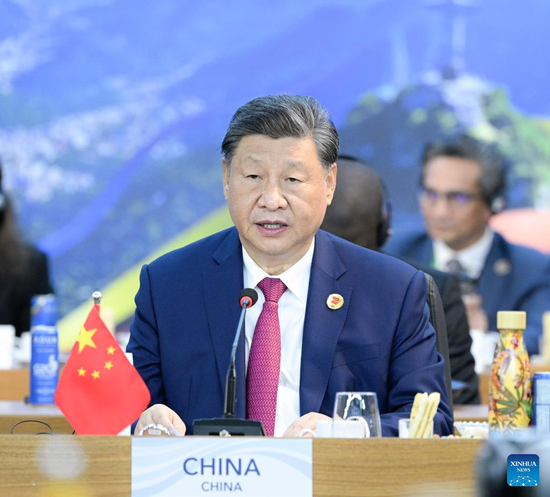
An array of photovoltaic panels in Otog Front Banner, Inner Mongolia autonomous region. CHINA DAILY
China's first energy law, to fully take effect on Jan 1, 2025, is set to fortify the legal framework within the energy sector, ensuring national energy security and catalyzing the shift toward green and low-carbon practices, experts said on Monday.
The energy law was approved in early November at the 12th session of the Standing Committee of the 14th National People's Congress, China's top legislature.
It includes nine sections, covering stipulations on energy planning, development and utilization, energy market systems, energy reserves and emergency measures, energy technology innovation, supervision and management, legal responsibilities and supplementary provisions among others.
Experts noted that as the world's largest energy producer and consumer, China has long lacked a fundamental and overarching energy law. The introduction of the energy law will fill this legislative gap, significantly strengthening the legal foundation in the energy sector, ensuring national energy security and promoting green and low-carbon transformation.
Prior to this development, China had enacted individual laws in the energy domain such as laws on coal, electricity, energy conservation and renewable energy.
Wang Peng, a professor at North China Electric Power University, highlighted that the energy law will bolster the impetus for green consumption.
"It establishes clear objectives for green energy advancement and delineates the responsibilities of involved entities. Moreover, it articulates precise requirements for various renewable energy types including hydropower, wind energy, solar energy and more," Wang said.
"For instance, in the development and utilization of wind and solar energy, the law requires a combination of both centralized and distributed systems and lays a legal foundation for distributed power trading, microgrids and other innovative business models," he added.
Wang emphasized that the new energy law also fortifies institutional support for green energy consumption. Article 34 advocates for the establishment of mechanisms, such as green electricity certificates, to incentivize and propel green energy consumption.
Green electricity certificates serve as electronic IDs for green power transactions in China. Each certificate represents 1,000 kilowatt-hours of green power generated from renewable sources.
Jing Chunmei, director of the energy, green and low-carbon development research department at the China Center for International Economic Exchanges, underscored the necessity for a foundational and comprehensive energy law in China, especially in the context of evolving energy security and climate change challenges on a global scale.
The latest data from the National Energy Administration showed that the country had achieved a major milestone in renewable energy development with installations of wind and solar power generating units surpassing 1.2 billion kilowatts by end-July, which was six years ahead of schedule.
"This law was designed from a top-level perspective to establish the strategic goals and policy direction for China's energy development, clarify the rights and obligations of various entities, provide legal safeguards for China's energy security and energy transition, and help promote the establishment of a just, fair and equitable global energy system," Jing said.


















































 京公網安備 11010202009201號
京公網安備 11010202009201號